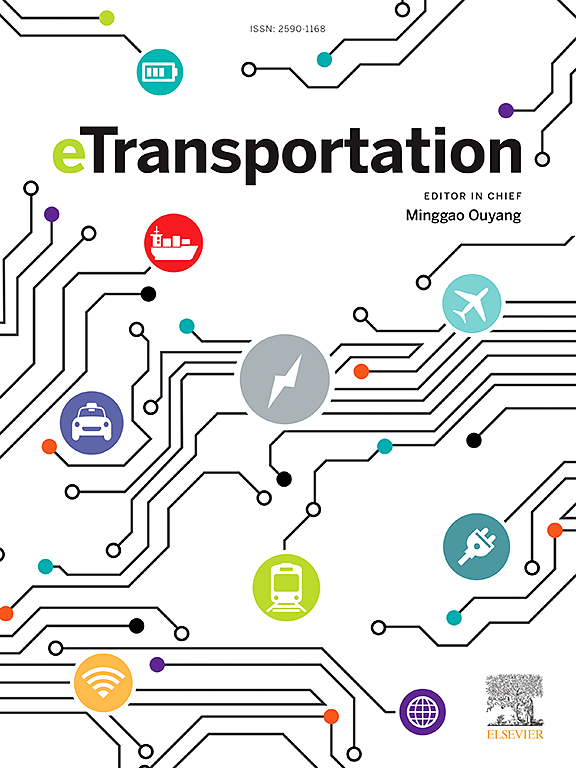Battery temperature anomaly early warning for electric vehicles under real driving conditions using a temporal convolutional network
IF 17
1区 工程技术
Q1 ENERGY & FUELS
引用次数: 0
Abstract
For preventing thermal runaway accidents in electric vehicles (EVs), it is crucial to conduct early warning for temperature anomaly in battery pack. Based on data collected by a naturalistic driving experiment with 20 EVs, this study proposes a temporal convolutional network (TCN) algorithm for battery temperature anomaly prediction. Firstly, 40 features encompassing battery signals, thermal management state, ambient temperature, and driving condition are extracted from micro-segments. Then, the most effective input features are selected between the 40 features through maximum information coefficient (MIC) correlation analysis, and the principal component analysis (PCA). After obtaining the optimal hyperparameters, the TCN model is trained using the data from four EVs. The model's performance in predicting temperature is assessed over the data of the remaining 16 vehicles. The results demonstrate that the model achieves accurate prediction with the maximum and minimum mean relative error (MRE) of 0.0132 and 0.0072 across the 16 test vehicles. Moreover, the model proves to be robust against different testing seasons, SOCs, and traffic conditions. Compared to convolutional neural network (CNN), long short-term memory network (LSTM), and CNN-LSTM models with same hyperparameters, the developed TCN model consistently obtains the lowest MRE on both training and testing. For two kinds of scenarios where the probe temperature changes slowly and rapidly, the TCN model can predict an impending temperature anomaly up to 40 min in advance, and forecast the temperature anomaly within the future 8 min, respectively. Among the 16 vehicles, 81.25 % demonstrate a high prognosis accuracy, with an average F1 score of 0.951 across 10 of the vehicles. Thus, the proposed method can provide accurate battery temperature anomaly early warning for EVs under actual driving conditions.
基于时间卷积网络的电动汽车实际行驶工况下电池温度异常预警
为防止电动汽车热失控事故的发生,对电池组温度异常进行预警是至关重要的。基于20辆电动汽车的自然驾驶实验数据,提出了一种基于时间卷积网络(TCN)的电池温度异常预测算法。首先,从微段中提取电池信号、热管理状态、环境温度和驾驶状态等40个特征。然后,通过最大信息系数(MIC)相关分析和主成分分析(PCA),从40个特征中选择最有效的输入特征。在获得最优超参数后,使用4辆电动汽车的数据对TCN模型进行训练。该模型在预测温度方面的性能通过其余16辆车的数据进行评估。结果表明,该模型对16辆试验车辆的最大和最小平均相对误差(MRE)分别为0.0132和0.0072,达到了较好的预测效果。此外,该模型对不同的测试季节、soc和交通条件都具有鲁棒性。与具有相同超参数的卷积神经网络(CNN)、长短期记忆网络(LSTM)和CNN-LSTM模型相比,所建立的TCN模型在训练和测试上均获得了最低的MRE。对于探头温度变化缓慢和快速的两种情景,TCN模式分别可以提前40 min和8 min预测即将发生的温度异常。16辆车中,81.25%的预测准确率较高,10辆车的F1平均得分为0.951。因此,该方法可为电动汽车在实际行驶工况下提供准确的电池温度异常预警。
本文章由计算机程序翻译,如有差异,请以英文原文为准。
求助全文
约1分钟内获得全文
求助全文
来源期刊

Etransportation
Engineering-Automotive Engineering
CiteScore
19.80
自引率
12.60%
发文量
57
审稿时长
39 days
期刊介绍:
eTransportation is a scholarly journal that aims to advance knowledge in the field of electric transportation. It focuses on all modes of transportation that utilize electricity as their primary source of energy, including electric vehicles, trains, ships, and aircraft. The journal covers all stages of research, development, and testing of new technologies, systems, and devices related to electrical transportation.
The journal welcomes the use of simulation and analysis tools at the system, transport, or device level. Its primary emphasis is on the study of the electrical and electronic aspects of transportation systems. However, it also considers research on mechanical parts or subsystems of vehicles if there is a clear interaction with electrical or electronic equipment.
Please note that this journal excludes other aspects such as sociological, political, regulatory, or environmental factors from its scope.
 求助内容:
求助内容: 应助结果提醒方式:
应助结果提醒方式:


